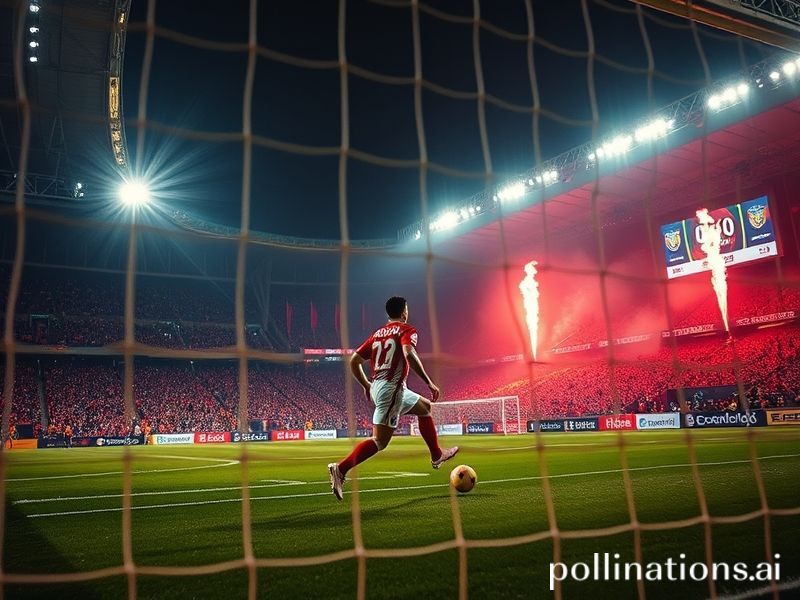Global Eye on a Lisbon Sideshow: Benfica vs Santa Clara and the Theater of Modern Life
Lisbon, 9 April — In the grand tapestry of global events, where nuclear submarines play hide-and-seek in the South China Sea and central bankers rehearse their lines about “transitory” inflation, a modest football match at the Estádio da Luz somehow elbowed its way onto the world stage last night. Benfica versus Santa Clara, a fixture that sounds less like a clash of titans and more like a polite disagreement over a dinner reservation, ended 3-0 for the Eagles, sending ripples—admittedly small, pond-like ripples—across continents.
To the uninitiated, this is merely three points in Portugal’s Primeira Liga, a league whose television rights are sold for sums that wouldn’t cover a week of Cristiano Ronaldo’s hair gel budget. Yet zoom out and you’ll notice the geopolitical subplot: Benfica’s starting eleven featured players born on five different continents, including a Uruguayan defender who once contemplated quitting football to herd cattle and a 19-year-old Angolan winger whose WhatsApp status still reads “Pray for me.” Santa Clara, meanwhile, fielded a squad assembled from the great Portuguese diaspora pipeline, a testament to the fact that globalization has turned even the remote Azorean archipelago into a finishing school for second-division Brazilians.
Viewed from Brussels, the match looked like a painless austerity package: cheap entertainment for a continent weary of war and energy bills. In Beijing, state broadcasters cut to the game during halftime of a carefully curated World Cup qualifier rerun, apparently deciding that Portuguese set pieces were marginally less threatening than Taiwanese election footage. On Wall Street, algorithmic trading bots briefly paused their usual diet of semiconductor futures to process the fact that Benfica’s victory nudged the club’s market capitalization above that of three listed Greek banks combined—an achievement both impressive and faintly tragic.
The goals themselves arrived with the punctuality of German trains and the inevitability of British political resignations. João Mário opened the scoring via a penalty so soft it could have been marketed as cruelty-free cashmere. Rafa Silva doubled the lead after Santa Clara’s defense parted like tourists at a Lisbon tram stop. By the time Petar Musa added the third, the traveling Santa Clara fans—roughly 37 souls and a confused seagull—were already consoling themselves with sagres beer and existential dread.
International bookmakers reported modest turbulence: a surge of micro-bets from Lagos, where satellite delay makes live wagering an extreme sport, and a single $50,000 wager placed from a Toronto suburb that, sources say, originated from “some guy who swore he had inside info from a cousin who cleans Rafa Silva’s pool.” The wager lost, the cousin was unfriended, and global capitalism spun calmly onward.
In darker corners of the internet, conspiracy theorists noted that the match kicked off at precisely 20:15 Western European Time, allegedly aligning with a numerological pattern predicting the collapse of the euro. Their livestream chat scrolled faster than the Portuguese justice system, which is itself not saying much. Meanwhile, climate scientists calculated the carbon footprint of the floodlights—roughly equivalent to a medium-sized Slovenian village—and sighed the weary sigh of people who know no one will switch them off.
And yet, for 90 minutes plus stoppage time, the planet’s usual soundtrack of saber-rattling and crypto-scam press releases faded just enough to let 55,000 human beings scream in unison. Was it trivial? Absolutely. Was it necessary? Probably more so than the latest G20 summit. Because somewhere between João Mário’s theatrical tumble and the final whistle, the crowd achieved that rarest of modern miracles: collective attention without doomscrolling. For one brief slice of Wednesday night, the world’s problems were reduced to an offside flag and an underhit back-pass—manageable crises, solvable within the rules.
The players left to polite applause, the stadium lights dimmed, and the global village returned to its regularly scheduled programming of existential anxiety. But somewhere in the Azores, a kid kicked a ball against a garage door, pretending to be Rafa Silva. Somewhere in Lagos, a bettor refreshed his banking app, already plotting the next micro-gamble. And somewhere in Brussels, an economist filed the match under “non-material externalities,” which is eurocrat-speak for “things we can’t monetize but secretly enjoy.”
In the end, Benfica 3, Santa Clara 0. The universe remains indifferent, but at least it paused to smirk.







